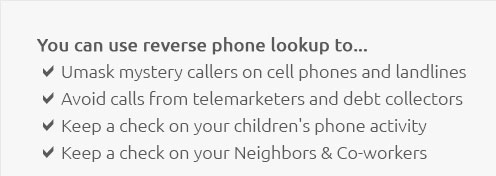 |
 |
 |
|---|
 |
 |
|---|---|
|
|
 |
|
|---|---|
 |
 |
 |
 |
 |
 |
|---|---|
 |
|
Reverse Search a Number: Unveiling the Power of Modern ConnectivityIn today's interconnected world, the ability to reverse search a number has become an invaluable tool for many. Whether it's verifying the identity of an unknown caller or simply satisfying one's curiosity about a missed call, this technology has transformed the way we interact with communication devices. The process of reverse searching a number is as fascinating as it is practical, offering users a glimpse into the vast web of data that underpins our digital age. The concept of reverse searching a number is straightforward. It involves inputting a phone number into a dedicated search engine or service, which then scans its extensive database to provide details about the caller. These details might include the caller's name, location, and sometimes even more personal information, depending on the privacy settings and data availability. The technology relies on aggregating data from numerous sources, including public records, social media, and other online platforms, to build a comprehensive profile of the number's owner. The benefits of this technology are manifold. For businesses, it aids in vetting potential clients or partners, ensuring that interactions are based on trust and transparency. For individuals, it serves as a protective measure against the increasing number of spam calls and potential scams. By identifying the source of a call, users can make informed decisions about whether to engage or ignore, thus safeguarding their personal information and time. However, with great power comes great responsibility. The ability to reverse search a number raises significant privacy concerns. In an era where data privacy is a hot-button issue, the ease with which personal information can be accessed is alarming to some. Critics argue that such tools can be misused for stalking or harassment, highlighting the need for stringent regulations and ethical standards governing their use. It's a delicate balance between accessibility and privacy, one that continues to evolve as technology advances. From a practical standpoint, several services offer reverse phone lookup capabilities. Some are free, providing basic information, while others charge a fee for more comprehensive details. It's essential for users to research and choose reputable services, as not all providers adhere to the same standards of accuracy and privacy protection. User reviews and expert recommendations can serve as valuable guides in selecting the right tool.
In conclusion, the ability to reverse search a number is a testament to the power of modern connectivity. It exemplifies how technology can enhance our lives, providing convenience and security. Yet, it also serves as a reminder of the importance of maintaining ethical standards and respecting privacy. As we continue to embrace digital solutions, it is crucial to remain vigilant and informed, ensuring that our use of such tools aligns with both personal and societal values. https://support.google.com/websearch/thread/67060165/how-do-i-perform-a-reverse-phone-number-search?hl=en
Hi Dacia, Perhaps that phone number is tagged on the images. Do an image search using the phone number in quotes, and see what shows up then. https://community.aarp.org/t5/Computer-Questions-Tips/Reverse-Search-for-telephone-no-s/td-p/2402081
Need to find a good, free reverse telephone number search engine. Back in the good Ol' days before cellphones or fake telephone numbers. https://www.quora.com/How-do-I-do-a-reverse-phone-lookup-on-Google
To look up a phone number on Google for free(1-888-971-0948), simply type the number (with or without the area code) into the search bar. If ...
|
|---|